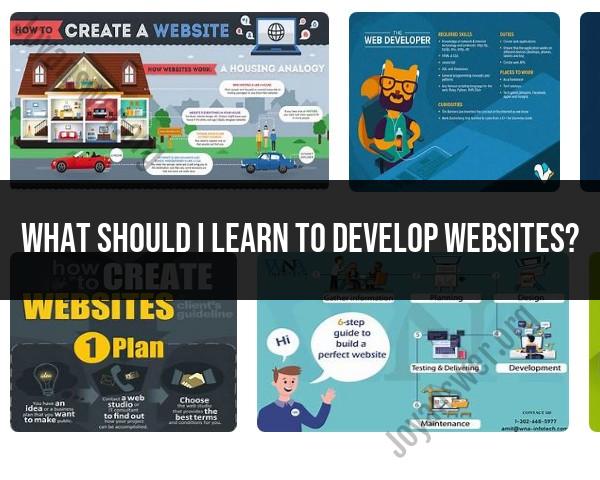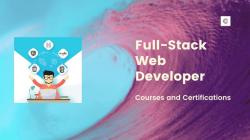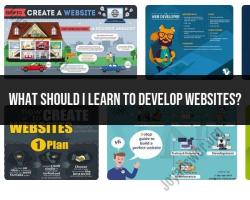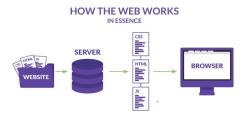What should I learn to develop websites?
To become a website developer, you should acquire a combination of technical and non-technical skills. Here is a list of essential skills for website development:
HTML (Hypertext Markup Language):
- HTML is the fundamental markup language used for structuring the content on web pages. It defines the elements and layout of a webpage.
CSS (Cascading Style Sheets):
- CSS is used to style and format the HTML content. It controls the visual presentation of a website, including layout, colors, fonts, and responsiveness.
JavaScript:
- JavaScript is a scripting language that adds interactivity and dynamic behavior to websites. It is commonly used for client-side scripting, allowing you to create interactive user interfaces.
Responsive Design:
- Understanding responsive design principles is crucial. This involves designing websites to provide an optimal viewing and interaction experience across various devices and screen sizes.
Version Control/Git:
- Version control systems like Git are essential for tracking changes in your code, collaborating with others, and managing different versions of your project.
Command Line/Shell:
- Basic command line skills are valuable for interacting with your computer and servers. It includes navigating directories, managing files, and running commands.
Web Browsers and Developer Tools:
- Familiarity with web browsers and their developer tools (e.g., Chrome DevTools) is essential for testing and debugging your web applications.
Text Editors/IDEs:
- Using text editors or integrated development environments (IDEs) is necessary for writing and editing code efficiently. Examples include Visual Studio Code, Sublime Text, or Atom.
Frontend Frameworks:
- Learn a frontend framework such as React, Angular, or Vue.js. These frameworks facilitate the development of dynamic and interactive user interfaces.
Backend Programming Language:
- Choose a backend programming language such as JavaScript (Node.js), Python, Ruby, PHP, or Java. This is necessary for server-side development and handling business logic.
Backend Frameworks:
- Learn a backend framework associated with your chosen programming language. Examples include Express.js (Node.js), Django (Python), Ruby on Rails (Ruby), Laravel (PHP), or Spring Boot (Java).
Databases and SQL:
- Understand databases and how to interact with them. Learn SQL for querying and managing relational databases. Familiarize yourself with database management systems like MySQL, PostgreSQL, or MongoDB.
APIs (Application Programming Interfaces):
- Learn how to work with APIs to fetch and send data between your frontend and backend. Understanding RESTful and GraphQL APIs is beneficial.
Web Security Basics:
- Gain knowledge of web security principles to protect your websites from common vulnerabilities. This includes securing against SQL injection, cross-site scripting (XSS), and cross-site request forgery (CSRF).
Basic Design Skills:
- Basic design skills, including an understanding of color theory, typography, and layout principles, can enhance your ability to create visually appealing websites.
Problem-Solving Skills:
- Develop strong problem-solving skills, as web development often involves debugging code, troubleshooting issues, and finding effective solutions.
Soft Skills:
- Effective communication, collaboration, and time management are important soft skills. Working in a team and understanding client or user requirements is crucial for successful web development projects.
Continuous Learning:
- Stay up-to-date with the latest web development trends, tools, and technologies. Web development is a dynamic field, and continuous learning is essential.
Remember that the web development landscape is broad, and specialization in specific areas (frontend, backend, full-stack, etc.) is common. As you progress, you may choose to deepen your expertise in certain technologies based on your interests and career goals. Building real-world projects and creating a portfolio to showcase your work is an excellent way to apply and demonstrate your skills.
Essential skills to master for website development
Becoming a skilled web developer requires mastering a diverse set of skills, encompassing both technical and creative aspects. Here are some essential skills to focus on:
Technical Skills:
- Front-end Development:
- HTML: The foundation of website structure, providing the content and meaning.
- CSS: Controls the website's visual appearance, styling elements like fonts, colors, and layouts.
- JavaScript: Adds interactivity and dynamic behavior to websites, enabling animations, form validation, and user engagement.
- Front-end Frameworks: Consider learning libraries like React, Vue.js, or AngularJS for faster and more structured development.
- Back-end Development (Optional for Full Stack Developers):
- Back-end Programming Languages: Popular choices include Python, Java, PHP, Ruby, and JavaScript frameworks like Node.js.
- Databases: Learn to store and manage website data using databases like MySQL, MongoDB, or PostgreSQL.
- Server-side Scripting: Understand how scripting languages like PHP or Python handle server-side processing and interactions.
- Version Control: Master tools like Git to track changes in code, collaborate effectively, and revert to previous versions.
- Web Performance Optimization: Optimize websites for speed, responsiveness, and accessibility to improve user experience and search engine ranking.
Creative and Soft Skills:
- User Experience (UX) Design: Learn to design websites that are user-friendly, intuitive, and cater to target audience needs.
- Visual Design: Develop an eye for aesthetics and understand principles of color theory, typography, and layout.
- Problem-Solving: Be able to identify and troubleshoot technical issues, think creatively, and find solutions efficiently.
- Communication and Collaboration: Clearly communicate ideas with clients, designers, and other developers, working effectively in a team environment.
- Continuous Learning: Embrace a growth mindset and stay updated with the latest web development trends, technologies, and best practices.
Additional Skills (Depending on Career Path):
- E-commerce Development: Familiarize yourself with platforms like Shopify and WooCommerce for building online stores.
- Mobile Development: Learn app development skills for iOS and Android platforms.
- Content Management Systems (CMS): Master popular CMS like WordPress or Drupal for managing website content effectively.
Remember, mastering these skills requires time, dedication, and consistent practice. Choose the right learning resources, build projects, and participate in online communities to accelerate your growth. Most importantly, enjoy the process of creating amazing websites!
I hope this information helps you navigate your web development journey! Feel free to ask any further questions about specific skills or resources.








